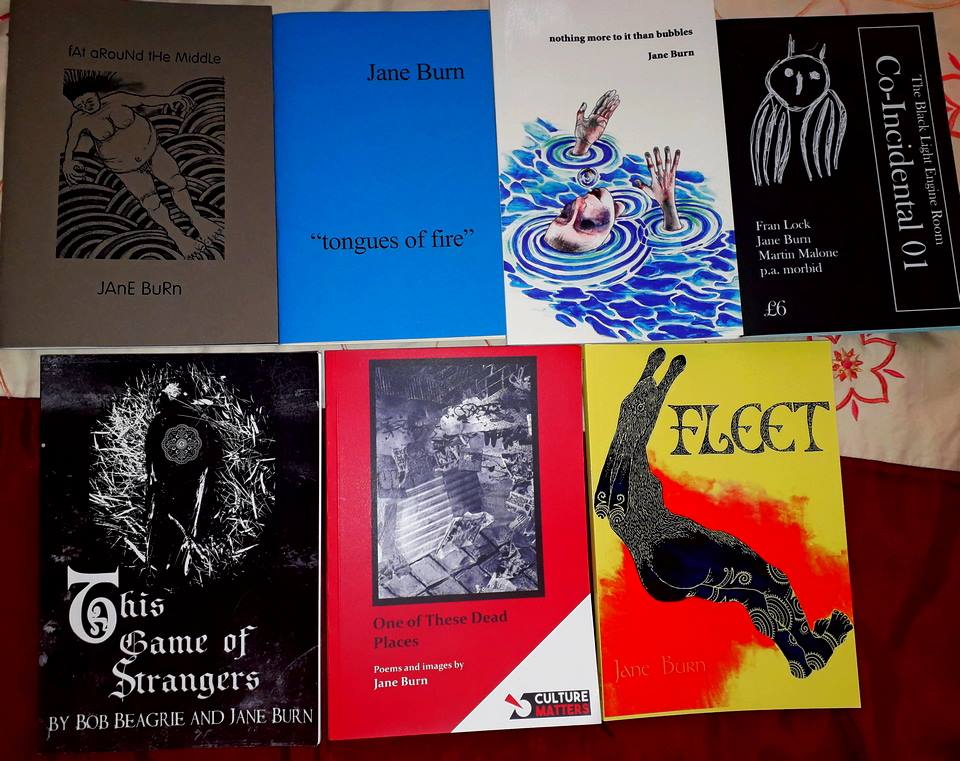
JANE BURN – POETRY AS HARD GRAFT, INSPIRATION, REACTION OR EXPERIMENT?
I interviewed poet & artist Jane Burn who won the Michael Marks Environmental Poet of the Year 2023-24 with A Thousand Miles from the Sea.
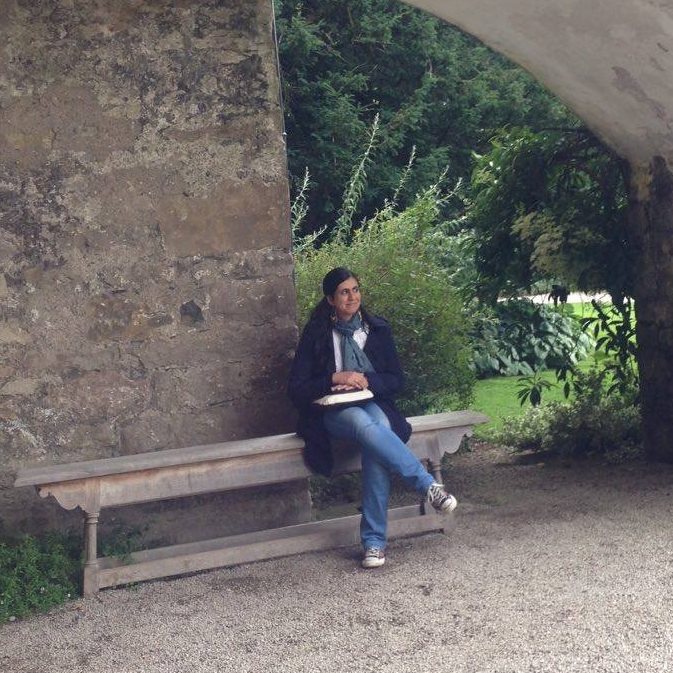
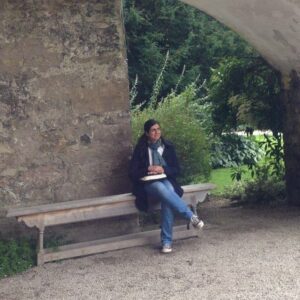
Librarian Zaberjad Iftikhar talks to Leslie Tate about her views on UK multi-culturalism. Zaberjad is a young, British-born woman, coming from a Pakistani family living in Burnley, Lancashire. As a librarian, she is widely read with a keen interest in culture, diversity and education. Zaberjad describes her younger self as, ‘split into multiple pieces so that I could fit in’ – but goes on to say how she’s come to feel, with age, ‘it’s OK to be different’.
Leslie: As a British woman with Pakistani parents (and possibly bi-cultural?), can you tell the story of the cultural stereotypes you’ve been subject to?
Zaberjad: This is a very interesting question, especially since I identify myself solely as a British woman rather than British-Pakistani. I think in the past, people have felt the need to put me in to a box – namely, the foreign/ Pakistani box.
A couple of incidents spring to mind where I’ve been subject to cultural stereotypes – here I’d like to say that language is very important to me, and the way in which people have labelled me, the words that they’ve decided to use, is what makes these moments memorable.
One was at university. I was nearing the end of my undergraduate degree, which was a combined major in French Language and English Literature. One of the French faculty members was speaking to some students about their plans for the future, and she turned to me and asked me what had made me study French because usually people like me were more inclined to study medicine or law. In her eyes, I was flagrantly defying convention. In my eyes, I was pursuing a qualification in two subjects that I had enjoyed studying throughout high school and college. It was a degree for personal pleasure. I remember wishing afterwards that I’d quipped something back about how not everybody is ‘like me’, or ‘people like me’ are not the same – though I have a foreign ethnic origin, I am not like all people who share that ethnicity. Much like how not all English people are the same. What surprised me the most was that she was a French tutor, who had lived in France, been exposed to another culture, and yet was still closed-minded enough to impose her stereotype on me. She didn’t do this maliciously. She may not have even realised that her words could be construed in this way. It may have just been a flippant observation, yet it stopped me in my tracks.
Another incident was more recent. A customer at the library in which I work approached me. She told me she was working with a women’s group that was aiming to help vulnerable females in the local area, and she wanted to brand it with a name and image related to healing. She asked me, “Do you people have a goddess of nature or something like that?” And she went on to tell me she knew of such things but couldn’t remember the name. I politely replied that there may be other cultures that have a goddess of nature in their teachings but it wasn’t something with which I was familiar. Again, I was being branded, over-generalised, labelled, and put in a box with all people from the Indian subcontinent. And again, there was no malicious intent; just another stereotype.
Something that happened regularly when I was younger was the random cry from somebody shouting, “Go back to where you came from!” This was always interesting because my response would be “Burnley, you mean?” Where else did I come from?
And I’m sure there are dozens more of these types of incident I’ve experienced and they have always left me feeling the same – sad. Sad, that I will always be seen as foreign and different, and in some rare cases, exotic. I just want to be seen as me. I don’t want to be defined by my ethnic origin, and I don’t want to have to justify being British.
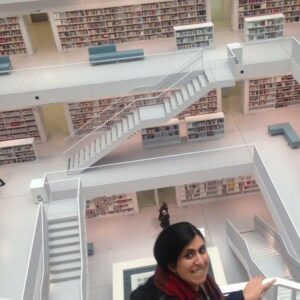
I am not a traditional Pakistani woman, though there are traditional elements to me. I tend to wear traditional Asian clothes at home, but prefer not to at work. I like to eat the food, but tend to blend Asian and western cuisine to create my own flavour. I also like to listen to foreign rock music, and read Russian literature, and delve in and out of science fiction and fantasy. I love the Japanese culture and have an interest in Animes. These things aren’t associated with Pakistani-ness. Nor are they associated with British-ness, for that matter. But they form a part of who I am. And stereotypes, sadly, do not allow for people to break from a convention that is imposed upon them.
Leslie: In what ways has it been difficult to find your own personal identity? Who or what has helped you?
Zaberjad: I think I experienced the difficulty of finding my own personal identity during my late teenage years. Before that, I felt as though I was split into multiple pieces so that I could fit in with different groups. This was especially true of my time in high school. I used to do everything I could to fit in with people. I’d speak Punjabi with my friends whilst being in the presence of non-Punjabi speakers; I’d listen to Bhangra music (which I didn’t particularly enjoy or understand); I’d watch television programmes and films that were mainstream so that I could join in on conversations about the latest trends. I used even to force myself to take an interest in make-up and fashion in the hope that I would be included, and not exiled from friends. I never wanted to be seen as being weird or different – this, I feel, is a universal journey. But people ARE different, and they deal with these situations differently. Some people exaggerate the fact that they are different and exclude themselves. I think it’s a make-or-break time in a person’s life. It also takes a while before you realise it’s okay to be different.
For me, I didn’t make a conscious decision to ‘revolt’ against being labelled Pakistani. Looking back, I did notice (and still notice) that people are given a choice in these instances. In my case, it was a choice to embrace the Pakistani-ness and move more towards my ethnic origin, or to revolt against that and lean more towards the English/ British-ness. I think I chose the latter because it allowed for more freedom, in my eyes. It gave me the freedom to be different, to explore and to broaden my horizons, rather than to focus solely on one culture, one set of rules, one way of life.
In this journey, and this realisation, my college tutors helped me, and so did some of my siblings. Being around open-minded people who are accepting of who you are and are not interested in tagging you is the best kind of support. Reading also helped me. It was one of my greatest solaces. I loved sitting in the library as a child, and this practice I returned to during my years in college. I spent a lot of time in the learning resource centre devouring books! I used to prefer fantasy, and I would read tomes, and series rather than standalone novels. It wasn’t until my second year in college that one of my English tutors introduced me to Russian literature, and from there I broadened my scope and read classics. These opened my mind to a different reality, and through books I explored people, and feelings, and thoughts. I, as part of studying English Language and English Literature for my A Levels, was given the tools to not only analyse what I was reading, but to analyse myself. To reflect on who I was and who I wanted to be. These were teachings I had grown up with as a Muslim – to be reflective, to understand myself, to always aim to be better and kinder – and it was refreshing to find myself slowly merging into the one, unified personality that I now am.
Leslie: How has living in Burnley and working in the library service affected/changed you?
Zaberjad: Up until fairly recently, I didn’t see myself as being ‘a professional’. I didn’t really know what I wanted to do with my life after education. All I knew was that I’d like to help people somehow. I decided a couple of years ago that I wanted to spend my life around books, and to make a career out of working in libraries. I started working in Burnley in November 2017 after finishing my MA in Library and Information Management.
I was dealing with customers face to face for the first time. Previously I’d worked in call centres and was most certainly not suited to those jobs! Working at the library has helped me to understand the importance of libraries in the community, and how some things are not quantifiable. Libraries are the hub of the community. People need them for different reasons and I am surprised at how much difference just the smallest conversation can make to a person’s day. I, on a regular basis, experience the ‘ripple effect’ brought on by an act of kindness. It’s rewarding, and humbling.
Working in the library helps me to appreciate the little things. It gives me perspective. Helping people makes me happy. And there’s no end to how uplifting a person’s gratitude, appreciation, and thanks is.
Leslie: Which books have had the greatest influence on you – why them?
Zaberjad: The million dollar question! As a child/young adult, I read (and re-read) books by Diana Wynne Jones. Mainly ‘Hexwood’, and the Chrestomanci series. She was an absolutely brilliant fantasy writer, who wrote about parallel universes and things (and people) not being as they seem. Perhaps this was an early indication of what was going on inside me!
More recently, I’d say Ursula Le Guin’s ‘A Wizard of Earthsea’ had a great influence on me. After reading it, I wished I’d discovered it as a child because I know I would have continually devoured it! The battle between light and dark is a common feature of fantasy works. This, however, was about the darkness within. I discovered it about three years ago, and then read all of the Earthsea novels. I have read ‘A Wizard of Earthsea’ at least once a year since first reading it.
‘The Master and Margarita’ by Mikhail Bulgakov was my introduction to the world of Russian Literature. A soviet satire, that is brilliant! Through it I became aware of censorship and the fear of exile that came with criticising the government. For me, it was a different kind of escapism from the fantasy stories I’d read. The language was challenging, and it also challenged my perceptions.
Most poignant of all, though, is Mary Shelley’s ‘Frankenstein; or, The Modern Prometheus’. The universality of the message, the exploration of loneliness and isolation, and the need to be accepted surprised me. How was it possible for a book that was written over 200 years ago to speak to me, in the 21st Century, and to describe some of what I had experienced?
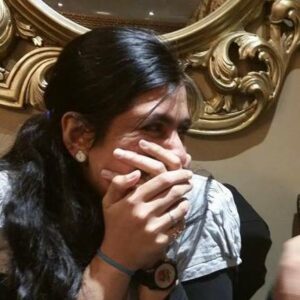
Leslie: What do you see as the difficulties and successes so far in developing a multi-cultural UK?
Zaberjad: I feel the UK is very multicultural. On a daily basis I am exposed to people from different backgrounds who battle the language and the way of life. The amazing thing about them is that they are trying to communicate in a foreign language, and to function in daily life in a foreign country. I am always amazed at how many people apologise to me for their low level of spoken English, and on a regular basis I tell them not to apologise because they are attempting to communicate and to become self-sufficient. I try to encourage them to continue practicing and speaking – their mistakes are a testament to their resolve to integrate.
The main difficulty is the integration/assimilation debate. I tend not to socialise in pubs because I don’t drink alcohol. Does that mean I have failed to integrate myself in this culture? Yet I understand that people in England do this, and it’s normal for them. I think people of all nationalities and ethnic backgrounds have different ways of living their lives, and rather than being closed-minded because of these differences, we should be open-minded and embrace them. We should try to understand better why people do what they do rather than raising our eyebrows because we fail to understand (or accept) another person’s way of life.
Acceptance, open-mindedness, and tolerance of other cultures; these are the difficulties that need to be overcome. I mean this in general terms. Not everybody is intolerant. I think we need to encourage the culture of “British-ness” which is inclusive of other cultures, rather than of “English-ness”.
Leslie: How do you view Pakistan and its people/culture, as a British person with a foot in both camps?
Zaberjad: I think this is an extremely complex question, and difficult to answer without offending people. I find that the British me conflicts with the Pakistani me. The two cultures, in my eyes, do not fit together very well – in some cases they are polar opposites. For example, as I was growing up, I was taught that a woman’s role in the Pakistani culture is very traditional; she has no need to be greatly educated; she is expected to be married and have children; she has no need to work and should be content in being dependent first on her parents, then her husband. Things are changing now, and have changed a great deal within the last decade. Conversely, British culture taught me that women can strive to be equal to men, they can educate themselves, and they can be independent – these things are accepted and encouraged.
But I’d like to stress that this is my personal view of things. Many people would disagree with me. I just happened to be brought up in a very traditional household where these kinds of things were not a priority. In saying that, I have attempted to balance the divide by incorporating parts of the Pakistani culture into my personality in order to enhance the British part of me and my personality. I call myself a ‘hybrid’ for this reason!
Leslie: Which groups of ‘intermediate’ or ‘hybrid’ people do you feel closest to?
Zaberjad: I’m not really sure, to be honest. I suppose I can understand anybody who feels they are between one thing and another – they are neither one thing nor another. I don’t very often speak about being an ‘intermediate’ person, nor do I put myself out there to find others like myself. A lot of the racial and identity issues I’ve been through have been internal battles. I’ve managed to get through them by reflecting on myself and the situations I’ve faced, by confiding in tolerant and open-minded people who listened. For a long time I felt I was broken or damaged because I couldn’t be like other people around me. I realised that I was neither. I was (and am) fine the way I am. I am ‘normal’ to me, and that’s all that matters.
Next week I interview book and lifestyle blogger January Gray about her distinctive online reviews, her historical research and her use of meditation and chakras to deal with Graves’ Disease.
ABOUT LESLIE TATE’S BOOKS:

I interviewed poet & artist Jane Burn who won the Michael Marks Environmental Poet of the Year 2023-24 with A Thousand Miles from the Sea.
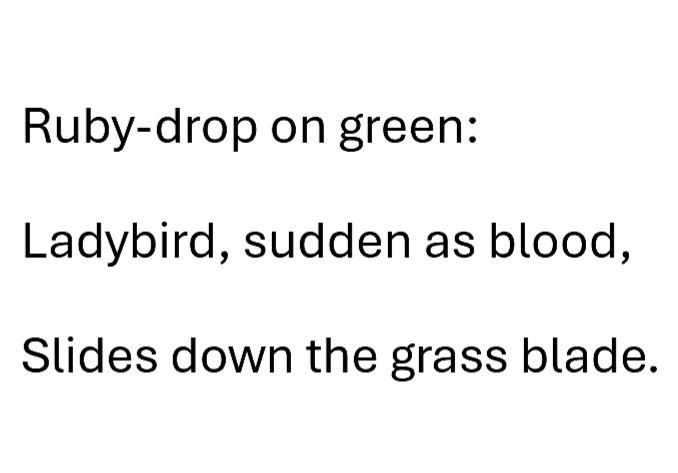
I interviewed ex-broadcaster and poet Polly Oliver about oral and visual poetry, her compositional methods, and learning the Welsh language. Polly says, “I absolutely love
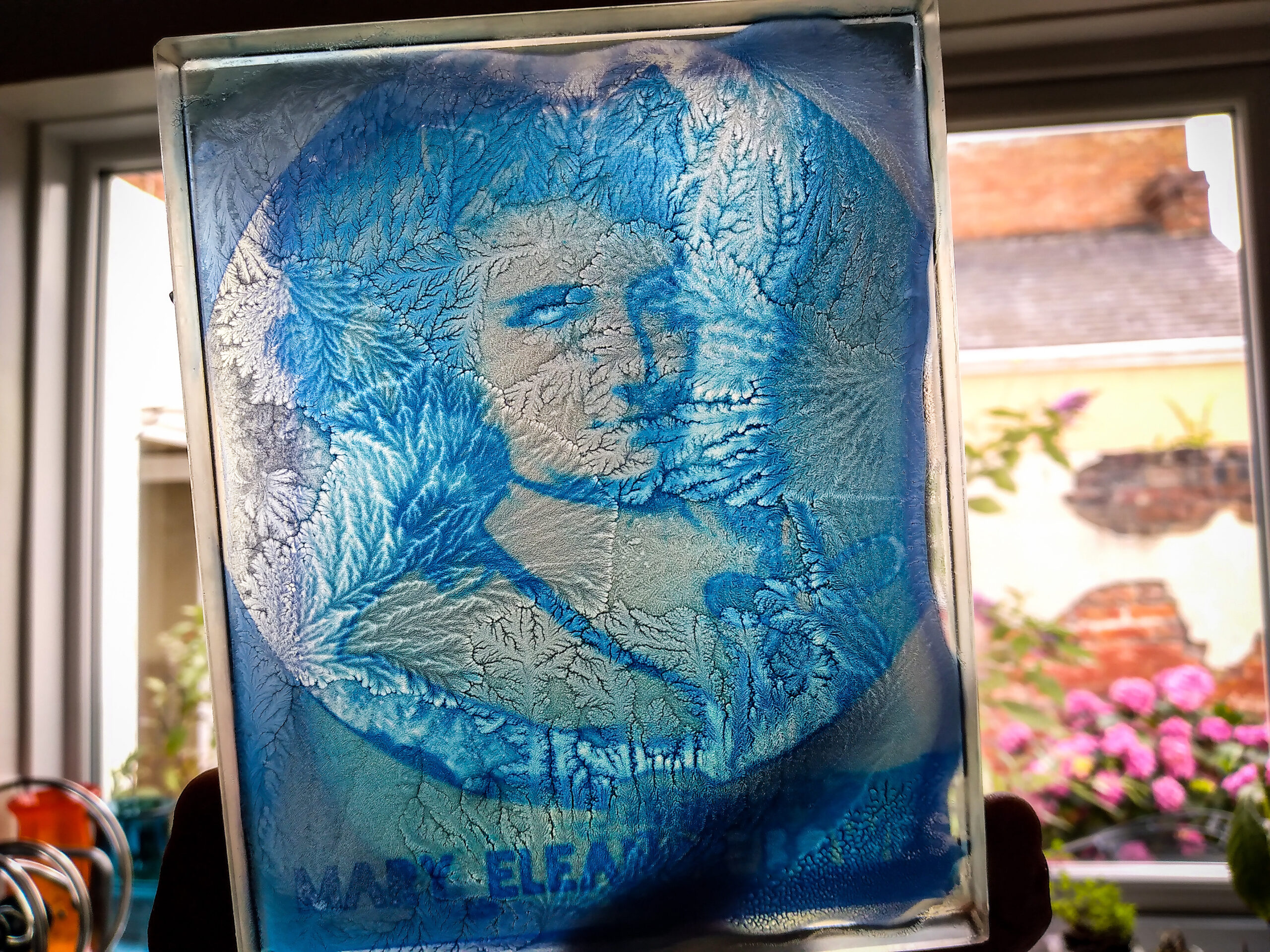
I interviewed Jo Howell who says about herself: “I’ve been a professional photographic artist since I left Uni in 2009. I am a cyanotype specialist.
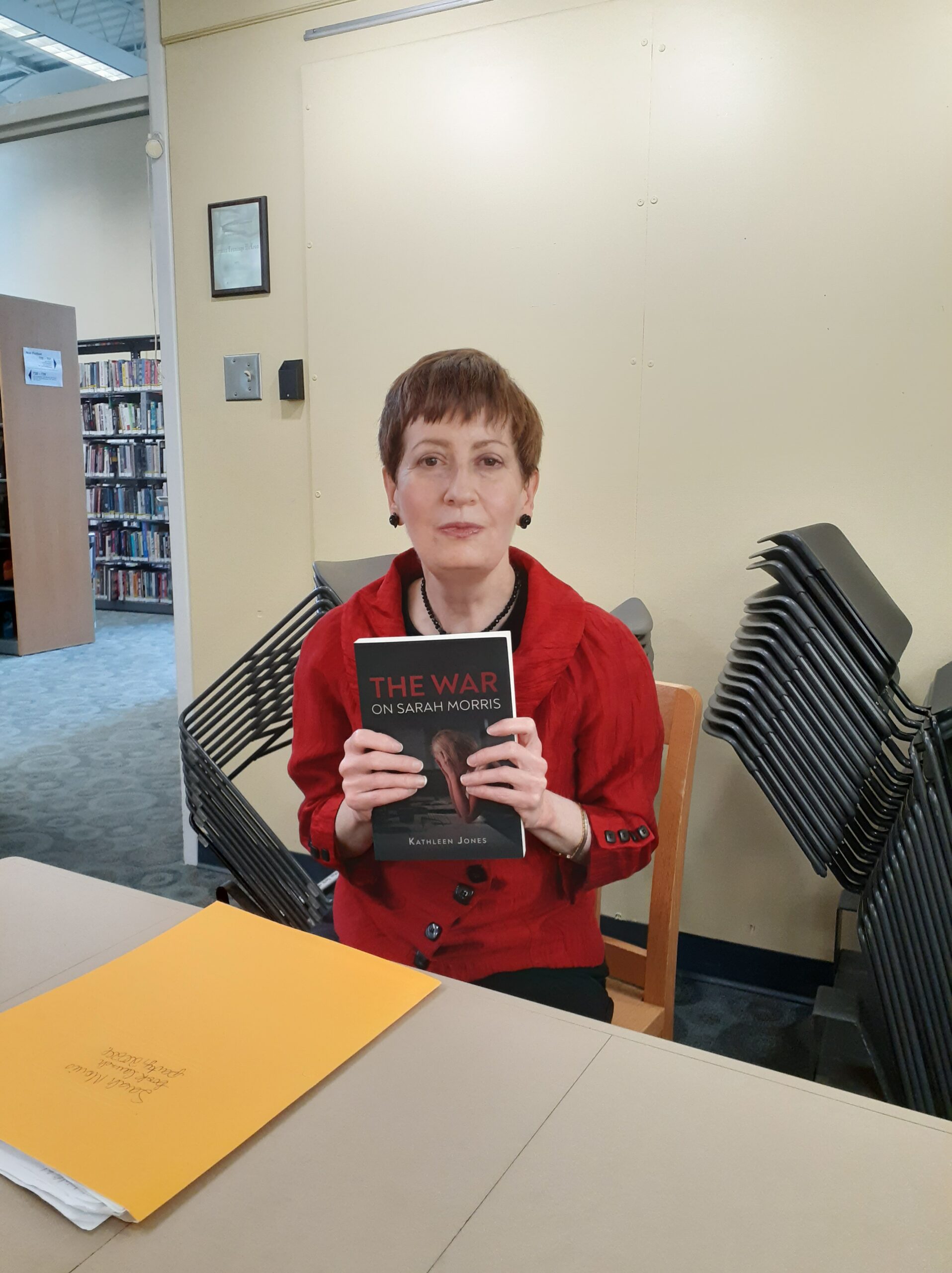
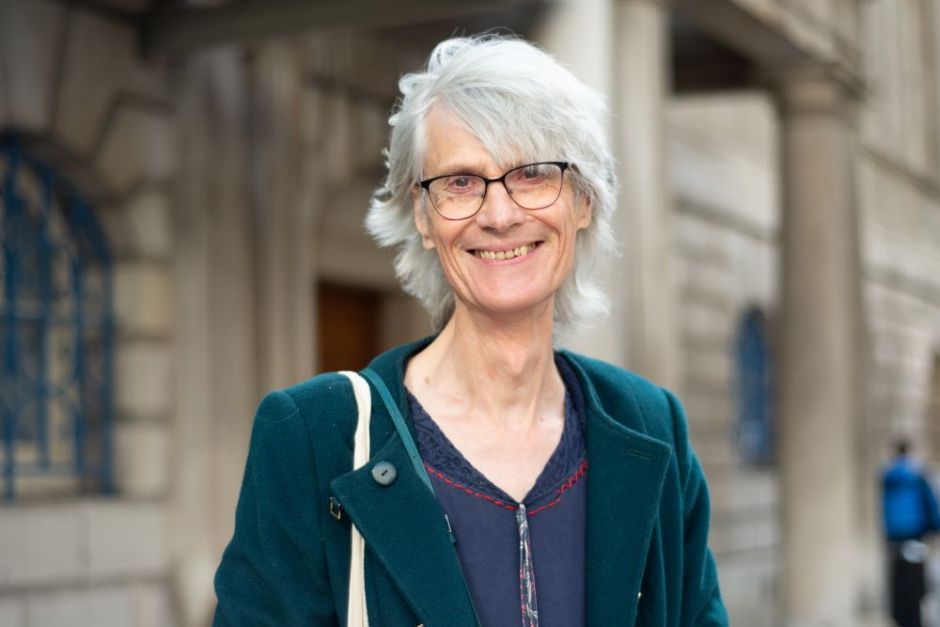
Poet Tracey Rhys, writer of Teaching a Bird to Sing and winner of the Poetry Archive’s video competition reviews Ways To Be Equally Human. Tracey,
| Cookie | Duration | Description |
|---|---|---|
| cookielawinfo-checkbox-analytics | 11 months | This cookie is set by GDPR Cookie Consent plugin. The cookie is used to store the user consent for the cookies in the category "Analytics". |
| cookielawinfo-checkbox-functional | 11 months | The cookie is set by GDPR cookie consent to record the user consent for the cookies in the category "Functional". |
| cookielawinfo-checkbox-necessary | 11 months | This cookie is set by GDPR Cookie Consent plugin. The cookies is used to store the user consent for the cookies in the category "Necessary". |
| cookielawinfo-checkbox-others | 11 months | This cookie is set by GDPR Cookie Consent plugin. The cookie is used to store the user consent for the cookies in the category "Other. |
| cookielawinfo-checkbox-performance | 11 months | This cookie is set by GDPR Cookie Consent plugin. The cookie is used to store the user consent for the cookies in the category "Performance". |
| viewed_cookie_policy | 11 months | The cookie is set by the GDPR Cookie Consent plugin and is used to store whether or not user has consented to the use of cookies. It does not store any personal data. |
6 responses
A lovely interview Leslie and delighted to meet Zaberjad..
Thanks, Sally. I met Zaberjad when I went with Mark Crane to Burnley Library for their literary festival. We were showing Mark’s film of my book. I’m always on the lookout for interviewees and while I was chatting with Zaberjad after the film asked her if I could send her questions. She agreed straightaway, and you’ve just read the result! L 🙂
Wonderful interview Leslie and Zaberjad. What struck me about the Pakistani tradition of a girl having “no need to be greatly educated; she is expected to be married and have children; she has no need to work and should be content in being dependent first on her parents, then her husband.” I was brought up in a Catholic family where expectations were the same for my sisters and I. Fortunately, we didn’t fulfill them! Thank you!
It’s so good to find these connections between what might seem very distant traditions – and your resistance to them!
Thank you for this thoughtful interview. As an American woman who’s lived in Britain for over a decade, is married to a Turkish-English man and who has Chinese and Chicano stepparents, I could really relate to this. People are so much more than labels, and culture is complicated. Sometimes we just need to be open to experiencing people as they are, without trying to put everyone into a box.
Absolutely!